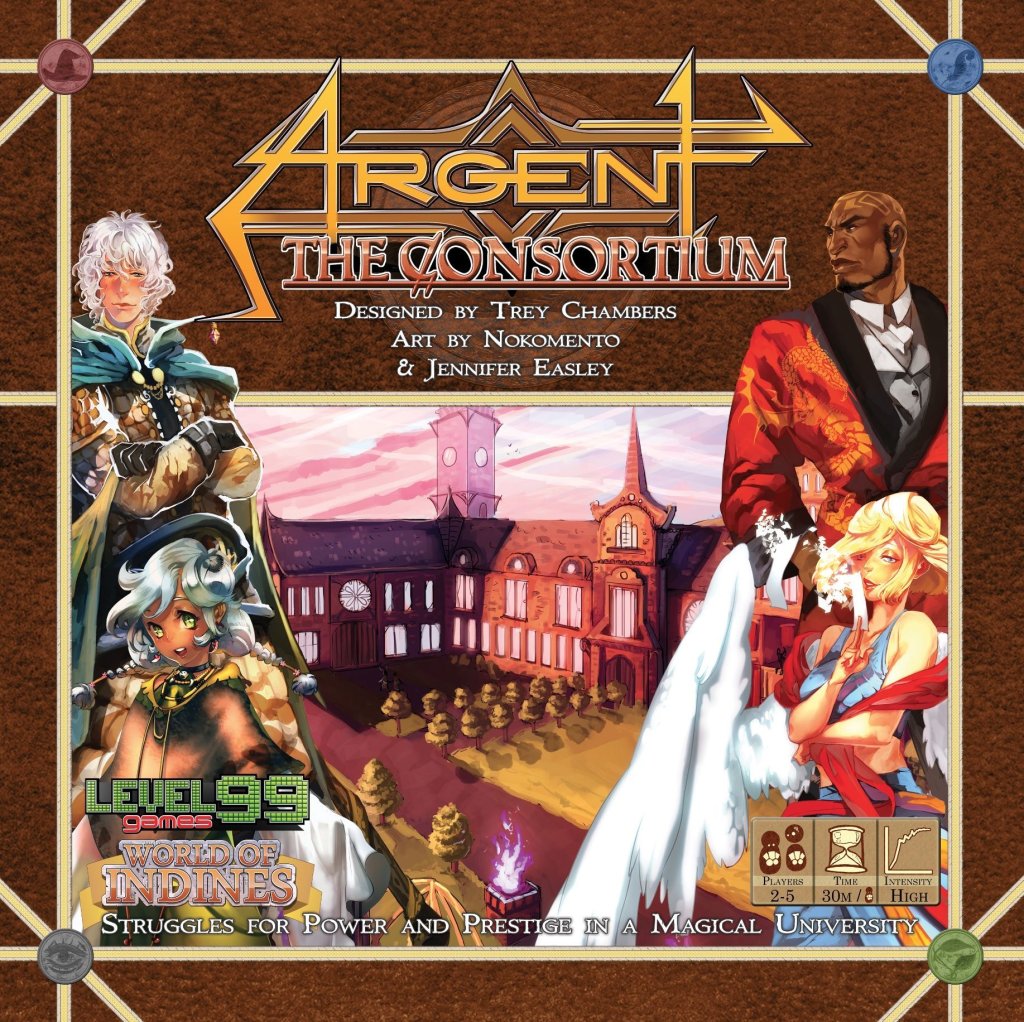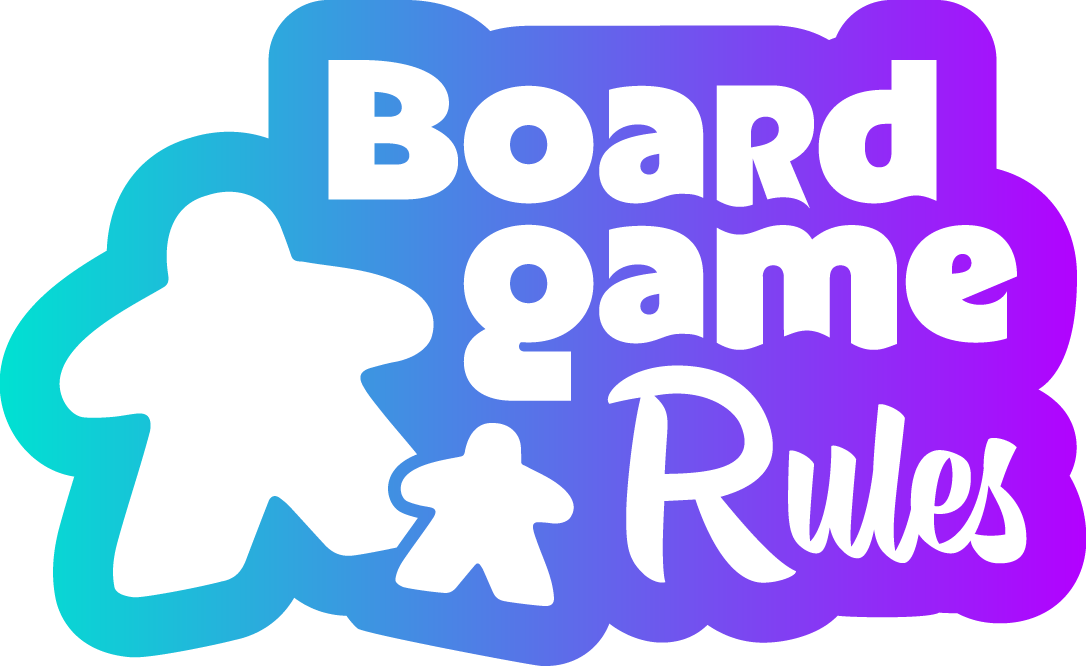Argent: The Consortium
2015
Argent: The Consortium is an intense, European-style board game. As potential Chancellors, players strategically build influence and use magic to outwit rivals.
150
minutes
2 - 5
player(s)
10+
Medium Heavy


About the game
Welcome to the world of Argent: The Consortium, a game of intense strategy and intriguing power struggles set in the magical world of Argent University. In this game, you are a candidate looking to become the next chancellor of the University. With its blend of worker placement, area control, and spellcasting mechanisms, Argent: The Consortium offers a unique board game experience.
The game is set in a vibrant, mystical universe where magic is an integral part of society. Argent University, the most prestigious magical institution in the land, is in need of a new chancellor, and you are one of the contenders for the position. To win, you have to earn the support of the Consortium, a secret board of influential individuals who will decide who will be the next leader of Argent.
Read More
Setup and rules summary
Game components Unboxing the fun!
Argent: The Consortium has a variety of components that are all essential to the gameplay. Each component has a unique role and interacts with the game in different, yet interconnected ways.
The game components include:
1. Game Board: The game board is the main component of the game, which represents the University of Argent. It consists of multiple rooms where players can place their mages.
2. Player Boards: Each player receives a player board, which represents their faction within the University. It is used to keep track of player resources such as mana, gold, and research.
3. Mage Pawns: Each player has a set of mages that they can place on the game board. Different mages have different abilities, affecting how they interact with the board and other players.
4. Consortium Cards: These cards represent the members of the Consortium who will be voting for the next Chancellor. Each card has a specific voting condition that players must meet to earn votes.
5. Spell Cards: Spell cards provide players with special abilities that they can use during the game. They can be purchased with research points.
6. Treasure Cards: Treasure cards represent various items that can be purchased or obtained during the game. They provide different benefits such as additional resources or special abilities.
7. Voter Cards: These cards are used to keep track of which players have earned votes from the Consortium. They are kept secret until the end of the game.
8. Bell Tower Card: This card indicates the rounds in the game. Once all its slots are filled with hourglass tokens, the game ends.
9. Candidate Cards: These cards represent the players’ candidates for the Chancellor position. They provide a unique ability to the player and a potential tie-breaking vote.
10. Supporter Cards: Each player has a set of supporter cards that can be used to influence the Consortium members and earn additional votes.
11. Tokens: There are several types of tokens, including Influence, Mana, Gold, Research, Wound, and Hourglass tokens. Each type of token is used differently in the game and provides different resources or effects.
In Argent: The Consortium, all these components interact to create a dynamic and strategic gameplay experience. Players must manage their resources, use their mages and cards effectively, and try to meet the voting conditions of the Consortium members to win the game.
Game flow Round and round we go
Argent: The Consortium is a strategy board game where players take on the role of faculty members in a magic university, aiming to gain influence and secure the votes of the Consortium. The game is divided into rounds, and each round has three phases: the Planning Phase, the Resolution Phase, and the Belltower Phase.
Planning Phase: During this phase, players will be able to perform numerous actions, including:
- Place a mage: Players can place a mage in a room of the University to gain a resource or to use the room’s special ability. This is the primary action of the game.
- Cast a spell: Players can cast a spell from their hand. Spells provide various powerful effects that can greatly impact the game.
- Gain a supporter: Players can spend influence to gain a supporter. Supporters provide additional votes and resources.
- Use a room ability: Some rooms in the University have special abilities that can be used by the player’s mages.
Resolution Phase: After all players have finished their actions in the Planning Phase, the Resolution Phase begins. During this phase, all the mages placed in rooms carry out their actions in a specific order, determined by the room. This could involve gathering resources, casting spells, or influencing the Consortium.
Belltower Phase: This is the final phase of a round. During the Belltower Phase, players check the Belltower cards to see if the round ends. The first player to have mages in all the Belltower spaces ends the round. After that, all players retrieve their mages from the university, refresh their spells and the game continues to the next round, starting again with the Planning Phase.
The game continues in this way for a predetermined number of rounds, after which the player with the most influence over the Consortium is declared the winner.
Players'turn One turn to rule them all
Argent: The Consortium is a highly strategic board game where players take on the role of candidates competing to become the next Chancellor of Argent University. Each player’s turn consists of several phases, with many possible actions and strategic choices to make.
Phase 1: Placement Phase
During the Placement Phase, players can place one of their Mages in an available room of the University. Each room allows the player to perform a different action, such as gaining resources or spells, influencing the voting members of the Consortium, or manipulating the game board in some way. Players can also cast spells or play cards from their hand during this phase.
- Strategic Choices: Choosing where to place your Mages is a critical strategic decision. You need to balance your immediate needs (like gaining resources or spells) with your long-term goals (like influencing the Consortium). Also, since rooms can only hold a limited number of Mages, you may want to block other players from taking certain actions.
Phase 2: Resolution Phase
Once all players have placed their Mages, the Resolution Phase begins. Starting with the player who has the First Player Marker and proceeding clockwise, each player resolves the actions of one of their Mages. This continues until all Mages have been resolved.
- Strategic Choices: The order in which you resolve your Mages can have a big impact on the game. For example, you might want to resolve a Mage in a room that lets you influence the Consortium before another player can block you.
Phase 3: End of Round
After all Mages have been resolved, the round ends. Players retrieve their Mages, any unclaimed resources are removed from the game board, and the First Player Marker passes to the next player clockwise. Then, a new round begins with the Placement Phase.
- Strategic Choices: At the end of the round, you need to think about your strategy for the next round. Which rooms will you target? Which spells or cards will you try to acquire? How can you best influence the Consortium?
End of Game
The game ends after a certain number of rounds, depending on the number of players. Then, the votes of the Consortium are revealed and the player with the most votes becomes the new Chancellor of Argent University.
- Strategic Choices: Throughout the game, you need to keep an eye on the Consortium and try to figure out how the other players are voting. This information can help you decide where to focus your efforts and which actions to take.
End of the game All good games must come to an end
The game of ‘Argent: The Consortium’ ends after the completion of the set number of rounds, which is typically five. Once all rounds are completed, players proceed to final scoring.
Victory Conditions:
In ‘Argent: The Consortium’, victory is determined by who has the most votes in the Consortium. Votes are gained by fulfilling certain conditions, which are revealed by the Consortium cards. There are a total of 12 Consortium cards (votes), and the player with the most votes at the end of the game is declared the winner.
The Consortium cards are initially hidden, but can be revealed throughout the game by certain spells or abilities. They represent various conditions, such as having the most Influence, having the most gold, having the most supporters, etc. It’s important to note that not all votes are based on resources – some are based on game actions or achievements, like being the first to fully research a spell or having the most wounded mages.
Actions Before Final Scoring:
Before final scoring, players must perform the following actions:
- Reveal All Consortium Cards: Any Consortium cards that have not been revealed during the game are turned face-up.
- Count Resources: Players count up their resources, such as gold, mana, intelligence, wisdom, and supporters. They also count any other quantities specified by the Consortium cards.
- Compare Totals: Players compare their totals for each condition specified by the Consortium cards. The player with the highest total for each condition earns the vote represented by that card.
- Resolve Ties: In the event of a tie for a condition, the player with the most Influence wins the vote. If there is still a tie, the player with the Archmage’s Privilege token wins.
Once all votes have been assigned, the player with the most votes is declared the winner. If there is a tie for the most votes, the tied player with the most Influence is the winner. If there is still a tie, the player with the Archmage’s Privilege token wins.
Scoring Did you outsmart your rivals?
Argent: The Consortium is a unique board game where the winner isn’t determined by the highest score, but by the most votes from the Consortium. The Consortium is made up of 12 voters, each with different scoring criteria. At the end of the game, the player who has satisfied the most voters wins.
Scoring Points
The scoring in Argent: The Consortium is based on the following criteria:
- Mana: The player with the most Mana tokens earns the vote of the Mana voter.
- Wisdom: The wisdom voter will vote for the player with the most Wisdom.
- Gold: The player who has the most Gold at the end of the game will earn the Gold voter’s vote.
- Supporters: The player with the most Supporters in their cohort earns the Supporter voter’s vote.
- Spell Mastery: The player who has learned the most spells of each type (destruction, divination, etc.) earns the respective spell voter’s vote.
- Mark of Mastery: The player who has the most marks of any one Department earns the respective Department voter’s vote.
- Bell Tower Cards: The player with the most Bell Tower Cards earns the Bell Tower voter’s vote.
Tie-Breaking Rules
In case of a tie, the following rules are applied in order:
- The player who is the first on the turn order track wins.
- If there’s still a tie, the player with the most Influence Badges wins.
- If there’s still a tie, the player with the most mana wins.
- If there’s still a tie, the player with the most wisdom wins.
Tips and tricks Play smarter, not harder!
Advanced Strategies for ‘Argent: The Consortium’
1. Plan Ahead: In a game like Argent, it’s crucial to plan your moves in advance. Try to predict your opponents’ moves and strategize accordingly. Remember, the game isn’t just about gaining the most votes, it’s about gaining the right votes.
2. Utilize Your Mages Wisely: Each mage has its own unique abilities. Using them strategically can give you a significant advantage in the game. For instance, the green mages can protect your spaces, while the red ones let you take extra turns.
3. Diversify Your Resources: Don’t just focus on gaining one type of resource. It’s vital to have a balanced collection of resources as the Consortium voters have diverse preferences.
Beginner Tips for ‘Argent: The Consortium’
1. Understand the Voting System: The main objective of the game is to win votes from the Consortium. Each voter has different criteria for voting, so try to satisfy as many criteria as possible.
2. Learn the Spells: There are a variety of spells available in the game. Understanding how to use them effectively can greatly improve your gameplay.
3. Use Your Influence Wisely: Influence points can be used to sway votes in your favor. Use them strategically to secure the votes you need.
Common Mistakes to Avoid in ‘Argent: The Consortium’
1. Ignoring Your Opponents: Many beginners focus too much on their own game and forget to watch their opponents. Always keep an eye on what your rivals are doing and try to counter their strategies.
2. Overlooking the Bell Tower Cards: The Bell Tower cards can significantly impact the game. Ignoring them can be a costly mistake.
3. Overspending Resources: It’s easy to get carried away and spend all your resources quickly. Try to manage your resources carefully to avoid running out when you need them most.
Ways to Optimize Gameplay in ‘Argent: The Consortium’
1. Balance Your Strategy: Don’t rely solely on one strategy. You should have a balanced gameplay that includes gaining resources, securing votes, and countering your opponents’ moves.
2. Pay Attention to the Game Progress: The game can change rapidly. Always pay attention to the game progress and adjust your strategies accordingly.
3. Learn From Your Mistakes: Every game is a learning experience. Reflect on your mistakes and try to improve in your next game.
